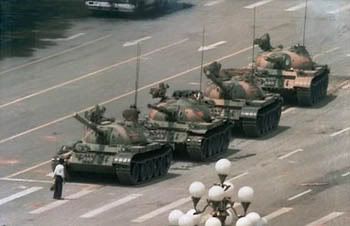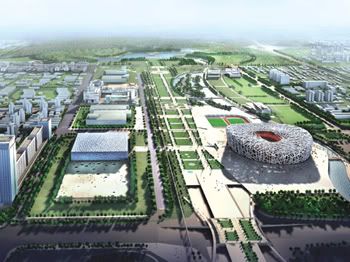
A man stands before a column of tanks sent to Tiananmen Square to suppress the Tiananmen Square protests of 1989.
The random attack yesterday of the in-laws of the U.S. Volleyball Team's coach and a Chinese Tour Guide in Beijing does not represent a political statement against the United States, does not represent a breakdown in Chinese Security or Authority, and it does not represent any form of intended disruption of the first Olympic Games to be held in China. Instead, the attack is just indicative of the problems all major cities face on a daily basis. That the attack happened to U.S. citizens and on the first day following the most brilliant opening ceremonies in Olympic history seems to be an unfortunate coincidence.
And yet, as random as the attack appeared to be, it might also be indicative of Beijing's Adolescence. The city, as ancient as it is, is a city of contrasts and very rapid change. Beijing is in the process of transforming itself from a city of secrets and isolation to one of the most modern, accessible, and technologically advanced cities in the world.

The Olympic Green of Today Contrasts Sharply with the Tiananmen Square of only 20 Years Ago
Change, let alone rapid change, never comes easily, and Beijing has seen unprecedented change over the last sixty years
.
On January 31, 1949, during the Chinese Civil War, Communist forces entered Beiping without a fight. On October 1 of the same year, the Communist Party of China, under the leadership of Mao Zedong, announced in Tiananmen Square the creation of the People's Republic of China and renamed the city "Beijing". Just a few days earlier, the Chinese People's Political Consultative Conference had decided that Beijing would be the capital of the new government.
At the time of the founding of the People's Republic, the city of Beijing and its surroundings consisted of just its urban area and immediate suburbs. The urban area was divided into many small districts inside what is now the 2nd Ring Road--or what we in the U.S. might consider an interstate that circles one of our large central cities--such as I-270 that circles Columbus in Ohio, or I-465 that circles Indianapolis. The Beijing city wall was torn down to make way for the construction of the 2nd Ring Road, which was finished by 1981 in accord with the 1982 city plan. That road was the first of a series of new ring roads intended for automobiles rather than for bicycles.
Following the economic reforms of Deng Xiaoping, the urban area of Beijing has expanded greatly. Formerly within the confines of the 2nd Ring Road and the 3rd Ring Road, the urban area of Beijing is now pushing at the limits of the recently constructed 5th Ring Road and 6th Ring Road, with many areas that were formerly farmland now developed residential or commercial districts. According to a 2005 newspaper report, the size of the newly developed Beijing land was one and a half times larger than the land of old Beijing within the 2nd Ring Road. Wangfujing and Xidan have developed into flourishing shopping districts, while Zhongguancun has become a major center of electronics in China. In recent years, the expansion of Beijing has also brought to the forefront some problems of urbanization, such as heavy traffic, poor air quality, the loss of historic neighborhoods, and a significant influx of migrants from poorer regions of the country, especially rural areas.
Sound familiar? What major city in the United States has not experienced the same type of growth over the last fifty or sixty years? Detroit, Columbus, Chicago, Los Angeles, Atlanta, Charlotte and Indianapolis are just a few examples of cities that have greatly expanded beyond their borders and "ring roads" or interstate beltways. All these cities share with Beijing the problems of dealing with an influx of population and the associated problems of urbanization--if not in their central cities, than in their surrounding areas and a great expansion and modernization of infrastructure. When areas grow too fast for infrastructure to keep up, the problems are exacerbated.
For a city such as Beijing and a country such as China, this adolescence might be particularly painful as the city is experiencing far more than just explosive growth--it's also experiencing a radical change in its culture. Detroit has a history going back to 1701, or just more than 300 years. Beijing has a history going back almost 5000 years; and until very recently, daily life in most of China has probably been mostly unchanged for all that time.
So how does a modern city with many neighborhood districts still maintaining simple ways of life with limited infrastructure and services and a culture that values hospitality and the welcoming of neighbors and even strangers deal with the migrants that enter its borders who commit random acts of violence such as the stabbing and suicide yesterday in Beijing?
I really don't know. But it's a social conundrum for the Chinese that they will need to grapple with if Beijing is to mature into a truly modern city while at the same time trying to preserve the people's ancient culture and values.
What are your thoughts? What do you think the people of Beijing can do to preserve their culture and values as they move into the 21st century and have to deal with all the problems that heavy industrialization and urbanization are creating for them?
Thanks for reading.
Technorati Tags: beijing, china, modernization, urbanization, olympic games, beijing olympics, culture, values, chinese history,
Generated By Technorati Tag Generator















5 comments:
Great post! You might want to check out my comments on China and the opening ceremony that can be found on my blog, The Artist's Muse. It can be found at http://www.sharonahart.blogspot.com
You present a serious question here and it will be interesting to see, one hopes they can retain their culture as they deal with the continued change, but it seems it doesn't always work out that way.
Thanks Sharon for the kind words. I visited your post and left a long comment there.
Sassy Mama Bear--you are exactly right! But I believe the Chinese have demonstrated through their opening ceremonies that they are more than capable of meeting any challenge if they are all united in heart and mind behind the project. I know that their heritage and culture is important to them...So the question they need to answer for themselves is how to best preserve it while they speed faster into the 21st century.
Thank you both for your comments, they are much appreciated!
I too believe that the Chinese have proven that they are very capable.
However, I do believe tat it is inevitable that we all always lose a little with any progress.
But perhaps that is the design of the universe.
Excellent article. Thank you for not forgetting about me while I have been having some problems.
I have a little something for you and this article just goes to show that you truly do deserve it!!
Hope to see you soon....I hope to be back full time in about 4 weeks!!:-))))
http://shinade.blogspot.com/2008/08/everything-changes-thanks-everyone.html
Wow - what a great, thoughtful post. I really enjoyed reading it. Thank you for sharing.
Post a Comment